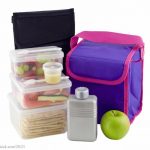It's almost Halloween! These Halloween food safety tips from Foodsafety.gov will help you make sure that your holiday celebrations are healthy as well as fun. Halloween food safety begins before trick-or-treating. Make sure that your kids have a good meal before they start out so they aren't tempted to snack from their goodies before you have had a chance to check them for safety. Tell your kids to wait until they get home before they eat any candy or treats. Tell your kids not to accept, and certainly not to eat, any homemade treats. Commercially wrapped candy and treats are the only safe choices. At home, check the treats for any signs of tampering. They may include an unusual appearance, discoloration, pinholes, or tears in the wrappers. Throw away anything that doesn't … [Read more...]
Penn State Extension Offers Tailgating Food Safety Tips
It's football season! That means fans are grilling out and picnicking at stadiums. But do you know how to serve safe food? Penn State Extension is offering tailgating food safety tips to keep you and your friends safe. You can download a free brochure of these tips by Catherine Cutter, professor of food science in the College of Agricultural Sciences and Penn State Extension assistant director for food safety and qualify programs. Safety starts when preparing for your tailgating session. First, if you are going to grill meat, make sure it is properly defrosted. Never defrost meat on the counter or outside. Defrost it in the fridge, and allow enough time to make sure it's thawed. Prepare a handwashing station to take to the stadium. Set up a five gallon water container with a … [Read more...]
FightBac Food Safety Tips For Hurricane Season
FightBac food safety tips for hurricane season have been released as Hurricane Ian approaches the southeastern United States, more specifically the west coast of Florida. Hurricanes can cause floods and power outages that can make food unsafe to eat and water unsafe to drink. These tips will help protect your family and pets from foodborne illness during and after a hurricane and other storms. It's important to prepare before the storm if you can. After you have finished securing your home and property, if you are riding out the storm, purchase and store food and water for your household in case the food supply is disrupted. Every person and pet should have at least one gallon of fresh potable water every day. For food, purchase non-perishable foods that have a long shelf life. … [Read more...]
Please Don’t Cook Your Chicken In NyQuil!
Another potentially dangerous and definitely irresponsible TikTok video has gone viral. This one gives details on how to cook chicken in NyQuil, an over-the-counter cold medicine. The FDA has condemned this practice, and not just because it's disgusting. This practice can be dangerous. The FDA says that any social media challenges involving medicines are dangerous because they do not use these products in the manner for which they are intended. Many of these TikTok "challenges" show people misusing nonprescription, or over the counter, medications and then encouraging viewers to do the same. The challenge encouraging people to cook chicken in NyQuil, which contains the drugs acetaminophen, dextromethorphan, and doxylamine, is unsafe because cooking that product will make all of … [Read more...]
It’s Back to School Time! USDA Has Safe Lunch Box Tips
It's back to school time! Many schools are starting in the next couple of weeks. And the USDA has safe lunch box tips to keep your child's lunch healthy and free from pathogens. More than 50,000,000 kids attend schools in the United States. A large percentage of them bring lunches from home. These lunches can be healthy, but if they are made with perishable items such as cooked meats, chicken, cheese, or egg, they must be kept at a safe temperature to prevent illness. For a safe lunch box and bag, start with an insulated lunch bag or box. Brown paper bags are not appropriate for any foods other than whole apples and cookies. The bag should be packed with a frozen gel pack or a frozen juice or drink box or water bottle to make sure that the food is kept out of the danger zone of … [Read more...]
FDA Releases Pesticide Monitoring Report For Fiscal Year 2020
The FDA has released its pesticide monitoring report for fiscal year 2020 with the news that 96.8% of domestically produced food, and 88.4% of imported food met federal tolerances set by the EPA. From October 1, 2019 to September 30, 2020, the FDA tested for about 75o different pesticides and selected industrial compounds on 2,078 human food samples (316 domestic and 1,762 imported) in the program. The domestic food samples were collected from 35 states and imported human food samples were collected from 79 countries. The maximum residue levels are set by the Environmental Protection Agency (EPA) to protect public health. These tolerances are established on the amount of residue that a food can contain. The domestically produced food group with the highest percentage of violative … [Read more...]
Summer Grilling Safety Tips From Consumer Product Safety Commission
Summer grilling safety tips from the Consumer Product Safety Commission will help prevent accidents and burns during this season. Gas and charcoal grills can present many risks, including burns, fire, and carbon monoxide poisoning. From 2016 through 2018, there were about 12 deaths per year involving these products. And last year, there were about 6,300 gas and charcoal grill-related injuries treated in emergency rooms. Before you light up the grill, check to see if your grill has been recalled. If it has, do not use it until it's been repaired or replaced. Then, check the grill to make sure there aren't any cracks or leaks. Hoses should be checked for brittleness, holes, cracks, and leaks. Never use grills indoors. In fact, don't even use your grill in your garage or a covered … [Read more...]
What Do You Know About Hot Dogs and Food Safety?
It's summer grilling time! With the Fourth of July holiday coming up, many people are going to be cooking burgers and sausages on the grill, including hot dogs. So what do you know about hot dogs and food safety? The USDA has some tips. Hot dogs, also known as frankfurters, are cooked or smoked sausages. According to federal regulations they must be made of comminuted semisolid products (reduced to minute particles) that are made of one or more kinds of animal muscle, including beef, pork, or poultry. Hot dogs may have a skin, or casing, or be skinless. The finished hot dog may not contain more than 30% fat or more than 10% water. Up to 3.5% non-meat binders and extenders can be added; those include cereal or nonfat or full fat dried milk or soy protein. While hot dogs are … [Read more...]
Fourth of July Food Safety Tips From the USDA
The USDA is offering food safety tips for the Fourth of July holiday. We all know the basic drill: cook properly, clean everything, sanitize often, and avoid cross-contamination, but it's a good idea to review these rules before you have lots of guests to feed. First of all, hot Fourth of July summer weather will play a part in food safety. As the temperatures rise, the risk for foodborne illness goes up. Not only do bacteria multiply more quickly in warm weather, but when the ambient air temperature is above 90°F, you must get prepared and cooked food into refrigeration after just one hour, not the usual two hours. To start, always wash your hands with soap and water for at least twenty seconds before and after cooking, and especially after handling raw meats, poultry, eggs, and … [Read more...]














